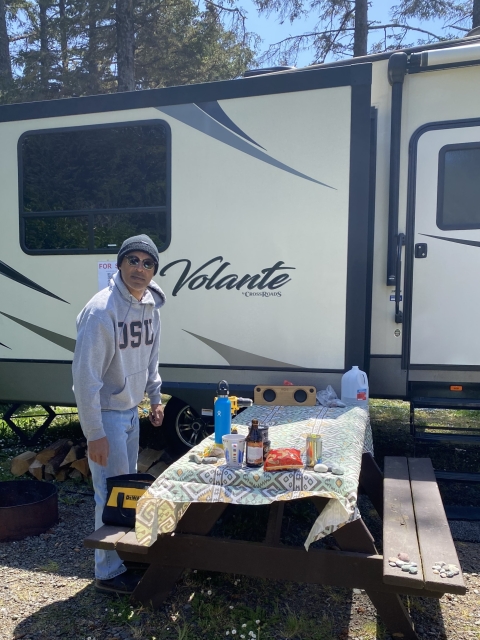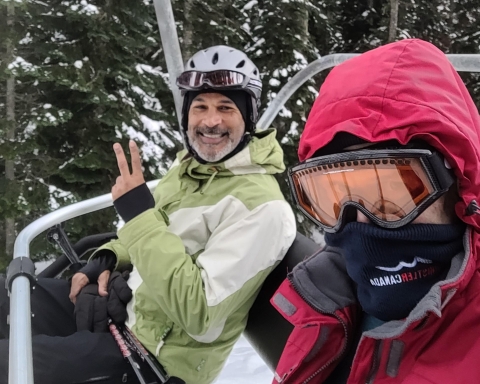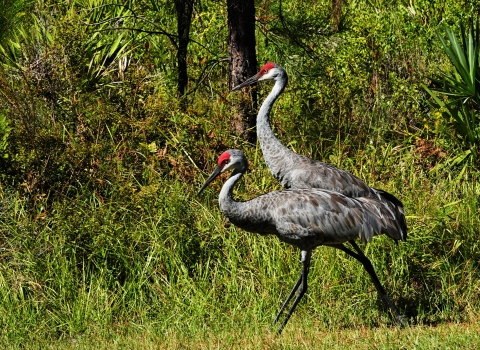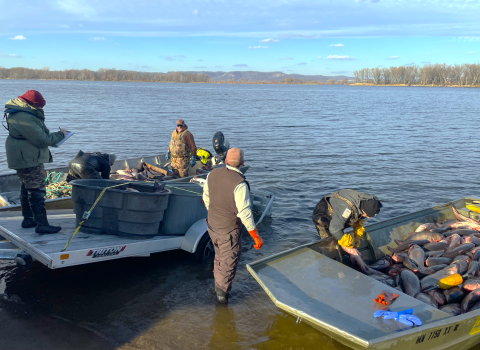Dan Nehler started his career with the U.S. Fish and Wildlife Service as a fisheries biologist in 1994. But working for the Service was not his original plan – Nehler had originally envisioned working in forestry. So how did he get from forests to fish?
Nehler credits his father with exposing him to formative experiences with the natural world. An avid recreationist and a civil engineer for the Federal Highway Administration, Nehler’s father designed roads in sensitive areas of National Parks, such as the Going-to-the-Sun Road in Glacier National Park, to enhance visitor experiences and minimize environmental impacts. Back in the day, much of the enjoyment of our National Parks was done from the inside of cars, and sometimes Nehler would join his dad for rides along these roads to project sites. These drives exposed Nehler to the great expanses of National Parks in the American West and sparked his interest. With this appreciation, he thought perhaps he would someday pursue a career in the outdoors.
Before college and pondering career options, Nehler went to his father’s office one day at the Federal Highway office in Vancouver, Wash., wondering how people decide what to study in college.
He wondered how aspiring career professionals know what they want to become and where they will work. So, he decided to walk down the halls at his dad’s office, and one by one would poke his head into an office and say, “Hi I’m Bob’s son, can I ask you a few questions?”
“Did you go to college? … What did you major in? … Did you plan to work here after you got your college degree?”
Universally, the answers to those three questions were, “Yes,” “Engineering,” and “No.”
Nehler realized that not one person he talked to that day had actually planned to work for the Federal Highway Administration in Vancouver before they went to college. He stumbled upon the conclusion that though you may not always fulfill your plan as you first envision it, the most important thing is to start your plan, explore what interests you, and go for the opportunities that may arise along the way.
Nehler went on to attend Oregon State University to initially study forestry. But he eventually majored in fisheries science and business administration, and he was hired by the Service before he even graduated from college.
“Luckily for me, the opportunities that arose while I was preparing in college led me to the Fish and Wildlife Service.”
Nehler’s experiences reinforced for him that pursuing his interests, even when he wasn’t sure where they would lead, helped prepare him to take those opportunities when they came. Hence, trading forests for fish.
Much of Nehler’s mindset about his journey centers around a quote by Oprah Winfrey, “I believe luck is preparation meeting opportunity. If you hadn't been prepared when the opportunity came along, you wouldn't have been 'lucky.'"
With almost 30 years with the Service, Nehler’s career has spanned the U.S. and crossed over numerous programs and disciplines. From fisheries in Arcata, Calif., to ecological services in Vero Beach, Fla., and places in-between, including the Service’s national training center in West Virginia (twice), his journey has not surprisingly included some challenges.
Nehler shares details about a difficult period in his career while in Florida working on Everglades restoration. It was fast-paced, high-stress, and led him to genuine burnout. He realized at the time that something needed to change. He tried applying for different jobs, but they did not materialize.
After a couple years of trying to find something different, he realized he had to change his mindset – that in order to sustain himself in his current position, he would need to treat it like a marathon rather than a sprint. He quit looking for new jobs and accepted that he would stick with it and slowed down to a more sustainable pace.
Shortly after this mindset shift, the phone rang and on the other end was his next potential new opportunity. The phone call came from a project leader who encouraged Nehler to apply for a vacant position at a new office. He reluctantly decided to apply, interviewed, and was selected for the position. Perhaps it was a coincidence, or luck, in that preparation met opportunity again for Nehler at just the right time.
“I believe a different mindset saved me,” he says.
“When I look back on it, it was very odd in the sense that I finally had accepted where I was and that I was just going to work there until I retired. Even though I had gotten burned out, I had tried to get out, couldn’t get out, then had to figure out how I was going to stay there; and when I was finally willing to stay there, even after running from a few hurricanes, I get this call.”
This was a life lesson for Nehler. He continues, “Sometimes you have to change your mindset before things will change in your life.”
Applying this shift to a positive mindset is how Nehler approached adversity in both life and his career.
He remembers growing up as a kid snow skiing in the Pacific Northwest, that he was often the only person of color on the slopes. Over the years, he has been pleasantly surprised to see a shift toward greater diversity in the skiing community. Likewise, in the Service, he acknowledges that earlier in his career, people of color were relatively uncommon in his line of work. But, he has been pleasantly surprised to see a shift towards greater diversity in the Service as well.
To his younger self, Nehler would give this advice: “Hang with it. There aren’t lot of people of color in a lot of the work that we do, but that doesn’t matter; the work is enjoyable, fulfilling, and there are good people to work with.”
Nehler has found mentors and friends who have been role models for him along the way. He talks about Judy Gordon, who leads the Fish and Aquatic Conservation Program of the Pacific Region with nearly 40 years of federal service under her belt.
“Judy Gordon has shown me what a woman of color can accomplish in our agency. She’s a very good communicator. She’s taught me a lot as a boss, as a friend, and as a mentor even if she doesn’t realize she’s my mentor. She’s been a very good role model for me in the short time that I’ve known her.”
Looking forward, Nehler sees his near-term and long-term goals as being close to the same; he focuses on his day-to-day job while knowing retirement is not too far into his future. For Nehler, the Service has been a great place to work with great people. And for the next generation, he offers this sound advice: Respect people and relationships. Treat people like you want to be treated. Treat the natural world like you want to be treated. Prepare yourself for future opportunities – keep your mind open and pursue your interests.





